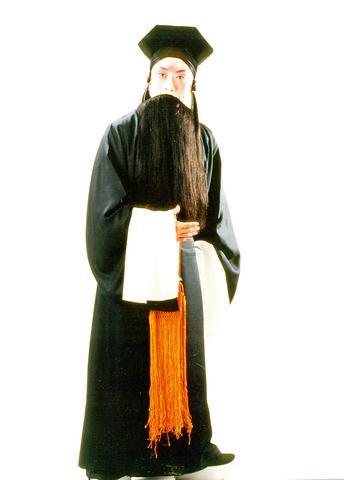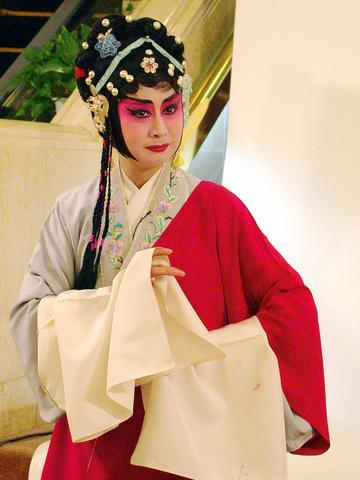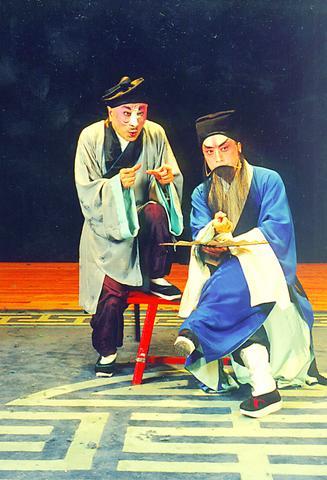Hugely popular martial arts opera star Li Bao-chun (李寶春) makes a welcome return to the stage this weekend for a series of performances at Taipei's Novel Hall. Entitled Choice Peking Opera with Li Bao-chun (新老戲之四齣好老戲), the series of shows, which begins tomorrow evening, will see Li teaming up with some of the biggest names in Beijing opera to perform reworkings of four classic operas.
Born in Hebei Province in 1950 to a celebrated theatrical family, Li was the first son of the legendary Beijing opera star, Li Shao-chun (李少春). At 10 he was admitted to the Beijing opera school where he studied for eight years. On graduation he was assigned to the Chinese National Opera Troupe.
Li relocated to the US in the mid-1980s, where he was awarded the outstanding Asian artist award by the Chinese American Arts Council in 1987. In 1989 Li moved to Taiwan and helped establish the Taipei Nova Chinese Opera Troupe, which he now heads.

PHOTO COURTESY OF KOO FOUNDATION
He specialized in the role of the bearded old man (Laosheng, 老生) in his formative years in China, but Li's name has since become synonymous in Taiwan with the high-flying martial arts combat hero, (Wusheng, 武生). While it is his high-flying portrayals of Wusheng and the Monkey King that have made such an indelible mark on Taiwan's opera scene, Li remains proficient in all operatic roles.
Organized by the Koo Foundation (辜公亮文教基金會), this weekend's performances feature four very different styles of opera that showcase not only Li's more acrobatic opera side, but also his down-to-earth and more vocal operatic skills as well. All the shows have been extensively reworked by Li in order to reduce their length and enable him to highlight the best parts.
The series includes a special adaptation of the Kun opera (崑曲) Fifteen Strings of Copper (十五貫), scenes from the classic Qing Dynasty opera The Jade Cup Named Snow White (一捧雪), the fast paced and high-flying martial arts opera Wu Zi-xu, the Innocent Fugitive (

PHOTO COURTESY OF KOO FOUNDATION
Performance notes:
What: Choice Peking Opera with Li Bao-chun (
Where: Taipei's Novel Hall (

PHOTO COURTESY OF KOO FOUNDATION
What: Saturday through Wednesday, June 9.
Tickets: Tickets cost from NT$500 to NT$1,500 and are available from ERA Ticketing Outlets nationwide, or direct from the Novel Hall.

That US assistance was a model for Taiwan’s spectacular development success was early recognized by policymakers and analysts. In a report to the US Congress for the fiscal year 1962, former President John F. Kennedy noted Taiwan’s “rapid economic growth,” was “producing a substantial net gain in living.” Kennedy had a stake in Taiwan’s achievements and the US’ official development assistance (ODA) in general: In September 1961, his entreaty to make the 1960s a “decade of development,” and an accompanying proposal for dedicated legislation to this end, had been formalized by congressional passage of the Foreign Assistance Act. Two

Despite the intense sunshine, we were hardly breaking a sweat as we cruised along the flat, dedicated bike lane, well protected from the heat by a canopy of trees. The electric assist on the bikes likely made a difference, too. Far removed from the bustle and noise of the Taichung traffic, we admired the serene rural scenery, making our way over rivers, alongside rice paddies and through pear orchards. Our route for the day covered two bike paths that connect in Fengyuan District (豐原) and are best done together. The Hou-Feng Bike Path (后豐鐵馬道) runs southward from Houli District (后里) while the

March 31 to April 6 On May 13, 1950, National Taiwan University Hospital otolaryngologist Su You-peng (蘇友鵬) was summoned to the director’s office. He thought someone had complained about him practicing the violin at night, but when he entered the room, he knew something was terribly wrong. He saw several burly men who appeared to be government secret agents, and three other resident doctors: internist Hsu Chiang (許強), dermatologist Hu Pao-chen (胡寶珍) and ophthalmologist Hu Hsin-lin (胡鑫麟). They were handcuffed, herded onto two jeeps and taken to the Secrecy Bureau (保密局) for questioning. Su was still in his doctor’s robes at

Mirror mirror on the wall, what’s the fairest Disney live-action remake of them all? Wait, mirror. Hold on a second. Maybe choosing from the likes of Alice in Wonderland (2010), Mulan (2020) and The Lion King (2019) isn’t such a good idea. Mirror, on second thought, what’s on Netflix? Even the most devoted fans would have to acknowledge that these have not been the most illustrious illustrations of Disney magic. At their best (Pete’s Dragon? Cinderella?) they breathe life into old classics that could use a little updating. At their worst, well, blue Will Smith. Given the rapacious rate of remakes in modern